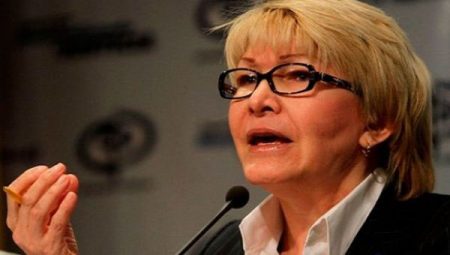CARACAS, (Reuters) – Venezuela’s ousted chief prosecutor said yesterday she fears for her life and is on the run, but will keep fighting for democracy and freedom in the country after being fired by a controversial new legislative superbody.
Luisa Ortega, who broke with President Nicolas Maduro in late March and became a vocal critic of his unpopular leftist government, spoke to Reuters at a secret location in Caracas after being fired by the constituent assembly on Saturday.

The pro-government Supreme Court has also said that a trial could begin against her but she has not formally been charged.
Still, the 59-year-old said she remained in hiding, moving between safe houses at least once a day, because she feared being arbitrarily thrown in jail amid an increasing breakdown of due process under Maduro.
“I do not know what dark intentions and dark plans they may have, not only to deprive me of my freedom, but also deprive me of my life,” said Ortega, sitting on a sofa in a safe house.
“I’m being permanently persecuted. There’s always a car following me, stopping where I stop, people taking photos of me and the places I go.”
On Saturday, Ortega’s office was surrounded by government troops and she was barred from entering. She fled on the back of a motorbike before being fired formally by the pro-government constituent assembly on its first day of work. Critics called the dismissal an affront to democracy.
Her firing came as the Supreme Court steps up the prosecution of opposition politicians, amid anti-government protests that are now entering their fifth month.
In recent weeks, the top court has jailed five opposition mayors in proceedings that critics say violated basic rights.
More than 120 people have been killed during often violent unrest against Maduro’s government over a crippling economic crisis and what opponents call Maduro’s increasingly authoritarian rule.
Officials in Maduro’s government have leveled a plethora of accusations against Ortega, from “insanity” and encouraging “terrorists” – a word often used by Maduro to describe opponents – to misusing a confiscated plane.
Ortega, who long toed the ruling Socialist Party line, was Venezuela’s chief prosecutor for over a decade.
Her office oversaw the 2014-15 trial of Venezuelan opposition leader Leopoldo Lopez, who was sentenced to nearly 14 years for his role in nationwide anti-government unrest in 2014.
The trial hinged on a heavily-disputed linguistic analysis that determined Lopez had used subliminal messages to urge violence in speeches in which he called for peace.
Ortega’s public change of heart came in March when she condemned the Supreme Court’s usurping of powers from the opposition-controlled Congress, a move that was quickly partially overturned.
She went on to strongly denounce what she deems violations of human rights and erosion of democracy under Maduro, who was narrowly elected in 2013 to replace the late Hugo Chavez.
In her last few weeks in the job, Ortega filed a flurry of indictments against top officials regarding corruption scandals and abuses during protests. It is not clear what will happen with these now she no longer is in the job.
Ortega’s removal was met by a flood of international condemnation.
She said she is still working hard for the country, holding meetings with both Venezuelan and foreign prosecutors as well as authorities in foreign countries, many of which have condemned Maduro’s government in recent months. She declined to specify which countries or exactly what that work entailed.
“I am the chief prosecutor of Venezuela,” she said, “but my rights are being denied.”
Maduro’s human rights ombudsman, Tarek Saab, a government ally who the opposition says has turned a blind eye to state abuses, was chosen to replace Ortega on Saturday.
After he was sworn in, Saab slammed Ortega for what he called her “complicity and inaction” in the face of the bloodshed during the protests in recent months.





